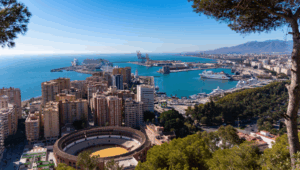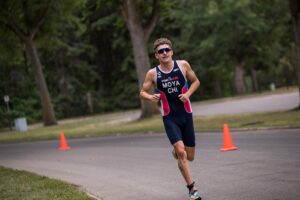Introducing Christian Mueller

Christian Mueller was the fastest overall age grouper in Kona this year with a 1:00:21 swim, a 4:47:09 bike and a 3:08:11 run for a 9:01:32 total time. That was good enough for 32nd place overall and thus a great bib number for 2010. He shared some of his thoughts with slowtwitch.
Slowtwitch: Congratulations on your overall age group win in Kona this year. How did you celebrate this win?
Christian: After crossing the finish line I was so utterly exhausted that I had to stay in the medical tent for about half an hour. Afterwards my wife met me in the athlete’s garden, we hugged and I have to admit that this was quite an emotional moment. All those days during the winter when you crawl out of bed, the weather outside is not very inviting and you push yourself to train, all the evenings when you come home late from work and then slog through another training session sometimes even two, all this had paid off! Directly after the race we knew that I should be first only in my age group division. The fact that no one else in the age groups was faster on this day we discovered only later by checking the results. On the day of the Award Banquet we closed the evening celebrating at Lulu's with other athletes, a couple of beers and good music. Coming back to Germany I was surprised with a big party crowd including my parents, relatives and the guys from my local sport club. Despite the jetlag we had a good celebration. They had prepared a wonderful welcoming. Thank you!
ST: Was this win expected for you (at least the age group win) or did this result surprise you?
Christian: In 2007 I finished in the Top 100 and so making the podium for my age group was not far away. I was just 11 minutes short. During the Award Banquet I saw these guys getting their 'Umeke (wooden bowls) in front of the crowd and thought that this would be it; someday entering the podium and getting one myself. One of these traditional bowls that people here in Hawaii use for storing sacred things, things important in their lives. I thought, on a perfect race day making the top five in my division would be something within my reach.
But winning the age group and also claiming the spot for the overall fastest age grouper was completely unthinkable. Even today sometimes I wonder if this has really happened. Then each time I end up looking up the result list and seeing my name for the 1000th time.

ST: Talk about how your race day went for you?
Christian: For the swim I tried to avoid the crowd by positioning myself on the far left side of the starting line. The crowd is always concentrating on the right side, taking the short way and profiting from the slightly better current for the way out to the turning point on the swim course.
After the first few hundred meters I was able to get the feet of someone swimming my pace and tried to stay out of trouble. I mostly drafted on his feet for the rest of the swim. All went well and I did not have to force myself. With the swim split I am not very satisfied. 1:00. No real improvement compared to 2007! I had hoped at least in this discipline to be faster. Especially since I started swimming in a squad a year ago.
On the bike it went comfortably for the first hour. I knew that the race normally gets harder after reaching Waikoloa. There, the wind gets stronger. At this point in the race I increased my efforts on the bike, and started to pass other athletes. Especially during the last 20 miles to Hawaii where we faced strong headwind I could improve my position in the race. On the way back to Kona only from time to time I could overtake other athletes. These were mostly professional women and a few male pros. The second bike part was demanding because I had to set the pace myself. Looking back the bike leg went very well, reflecting my concerted training in this discipline in the last few years.
Starting the run I was concentrating on taking mile splits on my watch and at each aid station getting the necessary drinks and from time to time a power gel. On the way out to the crossing into the Energy Lab it was really hot. Chrissi Wellington described it perfectly in her address at the banquet: It seemed as if someone had stretched the distance between the aid stations on the highway. At this time in the race I wasn't bothering anymore about my position at all. I was just racing as fast I could. Trying to keep the pace and hoping that it would last to the finish line. Even the moment passing Stefan I cannot remember. I was concentrating completely on myself. Running down Palani road my wife told me again that I was leading my age group. So I went for the line. All out.
ST: With your 3:08 marathon split you were able to reel in quite a few challengers for the overall spot, including Stefan Werner. You really did not know you were the first overall age grouper?
Christian: Starting the run some spectators were telling each other that I should be the first age grouper. I couldn't believe it and tried to avoid thinking about it. Also studying the results after the race it turned out that it wasn't true at this time in the race. At mile 8 my wife told me that I would be first in my division and I briefly thought something like "Wow" before concentrating on other things. Leading the division didn't change my race strategy at all. Crossing the line 2006 and 2007 I did not need to hold back myself or save some energy for a secure finish. My plan was to push myself form the start and try to keep this pace up as long as possible. As I mentioned before, realizing that being the first age grouper was for me more of a post-race experience.

ST: Your improvement from 2007 in Hawaii to this year is quite incredible, although looking at your 2006 result it appears that your 2007 race did not go very smoothly. That being said, even compared to 2006 you were almost an hour faster.
Christian: Well, with Christian Mueller in the race results it is sometimes a little bit confusing. There are a few of us with this name in the lists. In Frankfurt I finished 2006 and 2007 minutes within another Christian Mueller from Frankfurt. He also raced in Kona 2007 and had a bad day after recovering from a cold just before race day and he finished in that year with 10:47. Focusing on my results the improvement in Kona was steady. Finishing in 2006 with 10:05, 2007 with 9:22 and now with a personal best (PB) in 9:01. For the six IM I did in my career I raced for the qualification in these years in Frankfurt and there the improvement is comparably steady; chronologically achieving 9:53, 9:15, 9:09.
ST: Is even more improvement possible?
Christian: Well, this is a difficult question. Directly after the race I had stated that for me this was the perfect day with the perfect race. Time to move on and search for something else beside triathlon in life. Now, with a little time gap and after analyzing the results, maybe there are areas to improve.
First, transition. 1-2 minutes comparing my splits with other athletes in my range should be possible. This alone would have been enough to finish in under 9 hours. That is something worth trying.
Second, my run split. I never did a sub 3 marathon in one of my long distance races. My run is definitely something to improve. Having only a 1:19 as PB over the half marathon.
Third, the swim. 1:00 aren’t laurels I feel I can rest on. I could increase the structure and quality of the training, as I already did it on the bike and run.
But in this sport there is a kind of trade off. Improving in one area often means that the performance of the rest suffers. The key to success is to find the right mix. That’s the Holy Grail. Racing as an amateur means in my case also that I have a professional career, working full-time beside triathlon. So time is definitely a limiting factor to improvement. Being 37 you also have to consider that age plays a role. Recovery from training and racing takes more time than for someone in his twenties or early thirties. But in this case here are happily examples where seasoned athletes did very well in the Ironman circus. In Germany for example Frank Vytriasal. finishing in the last years several times top 3 at IM races and in Kona 14th in 2007 and 21st in 2006.
And also in other disciplines there is a tendency that older athletes prove that achieving astonishing results is possible. Outstanding examples are Lance Armstrong and Dara Torres. To answer your question, in general staying healthy, enjoying the chosen balance between work, family live and the sport of triathlon is for me more important than split times and result lists.
ST: You did not race in Kona in 2008. Why is that?
Christian: After my race in 2007 with place 83 on Big Island I was motivated like hell to improve further. Knowing that the run is my weakest discipline and the key to success I increased the mileage in the run sessions. Three months before the IM in Frankfurt I had to stop running owing to problems with posterior tibialis. So I decided to do no triathlons in that year and tried to focus on my bike and swim performance. At this time I decided for the first time to join a swim squad to get supervised training.

ST: How much time did you spend in Hawaii this time around?
Christian: We arrived one and half week before the race on the island. It is important that the body adjusts to the heat and the time zone. Especially if you arrive from Germany where temperatures have normally dropped and you are no longer training in the heat. In the two previous years we had to leave right after the race not having enough vacation days left for a longer stay. This year we could stay an additional
week, relaxing and enjoying the island.
ST: What is your day job?
Christian: Here in Germany I work for a big software company as software developer. The department I work in is responsible for the German payroll part of our product. So my colleagues and I have to deal with all those meticulous country-specific tax and social insurance regulations the government comes up every year. We are the ones who are responsible for people getting their paychecks.
ST: How much time are you taking off before starting your training again?
Christian: Usually I take off four to six weeks. Depending on how I feel. Both my wife and I enjoy this time; not to bother about training and no necessity for efficiently organizing day-to-day life. There's so much time left. Going out together, shopping, cinema. For me it’s a kind of payback time; giving something back to my wonderful wife.
ST: What do you have on your schedule for 2010?
Christian: At the moment only a few milestones are defined. I am listed for IM Frankfurt start of July. Preparing the IM in the last years always included doing a half distance race a couple of weeks before. I will stick with this. In addition to Frankfurt as far as I know I am already qualified for Kona 2010. So after Frankfurt I will have a second training cycle hopefully leading to a good race on the island.
ST: Do you train and race with a power meter?
Christian: Yes, I do. I bought it three years ago. It's an SRM. It generates a lot of data and I love to analyze it. I have numerous excel files with charts, keeping track of almost everything! My wife would tell you that I am a nerd filling out these files.
I use the power meter mostly for (1) Controlling my efforts in training sessions
(2) Comparing my performance with previous sessions e.g. year ago or training cycle before and (3) during the race not to over pace myself. Going more than 300 watt on a hill or headwind section will not work out for me in the long run.
ST: Tell us a little about your training leading up to Kona?
Christian: It's not rocket science. I am using the standard framework. Over the season several periods with varying emphasis. These periods are further split in cycles 3-4 weeks long and mostly with increasing workload. Working full-time implies that the long sessions have to be done at the weekend. Typically a week includes 10k swim, 350k bike and 50K run. Shifting between the bike and run depending on the training cycle or the weather.

ST: How different is your training now compared to a couple of years ago?
Christian: Between 15 and 20 years old I raced as a cyclist. Most of the stuff regarding training I learned during that time. With triathlon training I started in 2004, quiting sport almost completely in between. In more recent years the emphasis was on increasing quantity and quality, these were the main variables that changed. And it is still an ongoing process to find out which sessions work best.
As in my time as a cyclist, I am still someone who doesn’t often drop training because of bad weather. And I can tell you, on cold and rainy days you are almost alone on the streets.
ST: Do you follow any other sports?
Christian: In winter I go cross-country skiing and sometimes ice-skating. Sadly there is no time left for doing something else.
ST: Can you share with us some of your food likes and dislikes?
Christian: Omnivore with a soft spot for sweets and seafood. Leaving the highway and driving down the road to the Energy Lab you find an abalone and a lobster farm. I could recommend them both. There is only one no go: "Unprocessed" tomatoes but after applying a little heat everything is ok.
ST: What music do you like?
Christian: No special group to name but there are always a few titles around I hear almost on infinite loop. At this time Fire Away – Jupiter One or Farewell To The Fairground – White Lies. In connection with triathlon I have to mention Heroes from David Bowie. This title was played on the day I got my first Kona slot. Therefore it is special for me and hearing it on air provokes always kind of special feelings.
ST: What was the last book you read?
Christian: Blood River from Tim Butcher. The book is covering a journalist's travel along the river Congo, trekking the same route as H. M. Stanley did around 150 years before.
ST: Where do you see yourself in 5 years?
Christian: In the training period right before Kona, dealing with the heavy workload of working full-time and training I would definitely have told you that this was the last race and I would swap triathlon for fly-fishing, trying to be a better husband and raising children. But as past years, having a successful season means that fly-fishing is again rescheduled.
ST: Is there anything else we should know about you?
Christian: Hell, yes: In 2007 Germany hosted the age group world championships over the Olympic distance in Hamburg. Athletes were able to submit their race results for application. I was rejected for not being good enough. Man, I can tell you this was one of the biggest motivations ever in my triathlon career!







Start the discussion at forum.slowtwitch.com